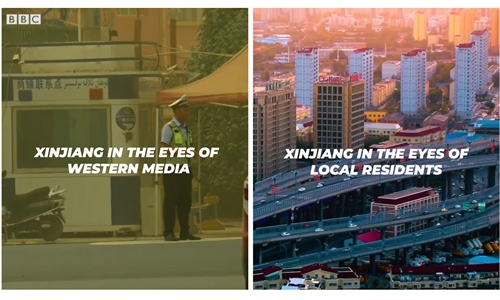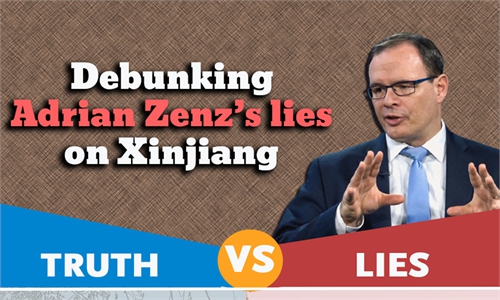Xinjiang companies, individuals sue rumormonger Adrian Zenz for reputational, economic losses
Pseudo-scholar’s lies cause reputational, economic losses

Debunking Adrian Zenz's lies on Xinjiang Infographic: Wu Tiantong/GT
A number of companies and individuals in Xinjiang Uygur Autonomous Region have sued German national Adrian Zenz, who has been spreading "Xinjiang forced labor" rumors and caused reputational and economic losses for locals.
International law experts noted the lawsuit conforms to protective jurisdiction, and suggested local entities claim high compensation from Zenz or file criminal charges against the pseudo-scholar to deter other politically motivated libel.
Companies and individuals in Xinjiang have filed civil lawsuits at a local court in Xinjiang, demanding Zenz to apologize, restore their reputation and compensate for their losses as his fake reports caused some countries and companies to suspend cotton imports from Xinjiang, news outlet ts.cn reported Tuesday.
Zenz, born in 1974, is an infamous anti-China pseudo-scholar. He is member of the Victims of Communism Memorial Foundation, a far-right organization established by the US government in 1993. Zenz has gone almost overnight from an unknown researcher into a go-to pundit on Xinjiang in 2018, as the US steps up its disinformation campaign against China.
He Zhipeng, a standing council member of the Chinese Society of International Law, told the Global Times on Tuesday the lawsuit shows Chinese entities are now using legal tools to protect their foreign-related interests and have sufficient evidence to sue rumormongers.
The litigation method based on facts and law is in line with international practice, and more acceptable and easier to get support, said He, who is also head of the Law School of Jilin University in Changchun.
Amid voices suspecting whether Chinese entities can file a lawsuit against Zenz — a foreign national in foreign territories, He said the protective jurisdiction applies to such a situation.
Protective jurisdiction means a Chinese entity can prosecute a foreign entity in foreign territories according to Chinese laws if the latter violates the former's interests.
China seldom uses protective jurisdiction, but if some foreign forces continue to spread lies and hamper China's interests, they should face the consequences, and we have plenty of evidence to present in court, He said.
Chinese Foreign Ministry spokesperson Zhao Lijian supported Chinese people who seek to protect their legal rights and the rule of law. "Zenz and the anti-China forces behind him will face justice," Zhao said at Tuesday's press conference.
Peng Qinxuan, an expert from the Wuhan University's Institute of International Law, suggested litigation against Zenz for jeopardizing national security under protective jurisdiction, as his deeds should be handled criminally.
Zenz is behind numerous "reports" on Xinjiang, which are full of sensational claims. The pseudo-scholar is also unsurprisingly among contributors of a Monday report published on the website of a Washington DC-based so-called think tank Newlines Institute for Strategy and Policy, claiming China's Xinjiang policies constitute "genocide."
The report again cited non-existent "evidence" that have been refuted repeatedly by Chinese authorities, Xinjiang residents and conscientious foreign diplomats and visitors.



